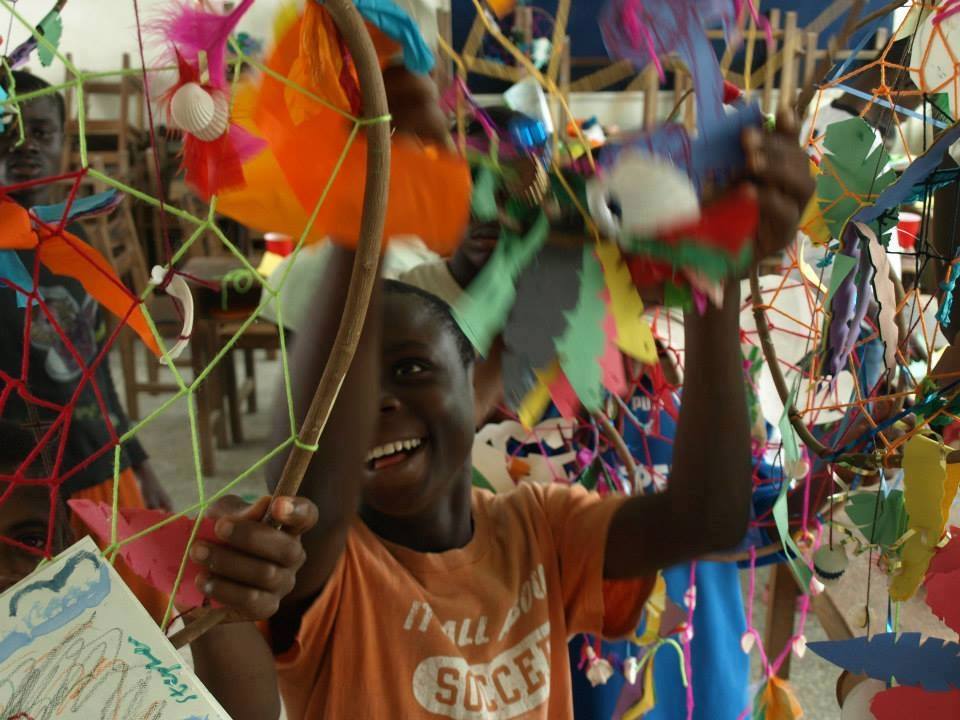A blog post by Melissa Ruisz Nazario based on a webinar presented by Susan Rowland, Ph.D.
“Depth psychology is a psychology of the creative imagination,” says Susan Rowland, Ph.D., Chair of Pacifica’s M.A. program in Engaged Humanities and the Creative Life. She explains that while depth psychology originated and continues to be a powerful form of psychotherapy, its devotion to the creative imagination makes it important beyond the consulting room.
Read More
Posted in:
Joseph Campbell,
archetypes,
Psychology,
soul,
depth psychology,
humanities,
Pacifica Graduate Institute,
sacred,
symbolism,
Spiritual
Is personal, intellectual, or creative growth one of your goals for this year, or for your life in general? Do you long to connect with others interested in the intersections of art, soul, and depth psychology? Let one of Pacifica’s upcoming events this spring be the catalyst for you to plug into our like-minded community, and get ready to experience and engage in deep, meaningful conversations where you are able to hold space for each other and learn new, exciting ways to explore your creative potential.
Read More
Posted in:
Pacifica Events,
Pacifica News,
Santa Barbara,
graduate school,
creativity,
art,
vocation,
Education,
depth psychology,
active imagination,
Pacifica Students,
Pacifica Graduate Institute,
resources
A guest blog post by Craig Chalquist, Ph.D., Associate Provost of Pacifica Graduate Institute.
Today is January 9th, which fans of the Great Detective have decided is his birthday. For those into astrology, this would make his natal sun sign studious, hard-working Capricorn. Sir Arthur Conan Doyle’s novels give no indication of the time of day Holmes was born, but I have a feeling, given his interests and how he pursued them, that his natal chart is nocturnal. No doubt Virgo, Mercury, Pluto, and Saturn had a lot to say to each other in it, especially in Houses 12 (secrets, mysteries) and 8 (death, rebirth, other people’s money).
I encountered Holmes as a result of committing a crime. When I was in high school, a bully made the mistake of picking on my friends and me. The school authorities did nothing, so I knocked him out at lunchtime and set his locker on fire for good measure.
Read More
Posted in:
C.G. Jung,
Psychology,
alchemy,
depth psychology,
narrative,
storytelling,
alchemist,
jungian,
relationship,
relationships
A blog post by Melissa Ruisz Nazario
In the preface to the thirtieth anniversary edition of her seminal book, Writing Down the Bones [1], first published in 1986, Natalie Goldberg explains why she thinks so many people want to write.
“I don’t think everyone wants to create the great American novel, but we all have a dream of telling our stories–of realizing what we think, feel, and see before we die,” she observes. “Writing is a path to meet ourselves.”
The “bones” Goldberg wants her students to write down is, in her words, “the essential, awake speech of their minds.” She acknowledges this is easier said than done: “But I also know that I can’t just say, okay, write clearly and with great honesty. In class, we try different techniques and methods. Eventually the students hit the mark, come home to what they need to say and how they need to say it.”
Read More
Posted in:
Joseph Campbell,
archetypes,
Psychology,
soul,
depth psychology,
sacred,
symbolism,
Spiritual
A guest blog post by Mary A. Wood, Ph.D., co-Chair of the M.A. Program in Engaged Humanities and the Creative Life at Pacifica Graduate Institute.
“The soul should always stand ajar, ready to welcome the ecstatic experience.” —Emily Dickinson
There are moments in life when time seems to stand still—moments when we find ourselves transfixed, and eventually transformed. These moments can be cosmic in scale, as reflected in the awe that we feel when beholding a rare solar eclipse, or an approaching storm. These moments may also be quite intimate, but no less moving, such as when we witness an animal emerging from hiding or when we hear an exquisite song. We recognize, and always remember these moments because they are announced by bodily sensations; we gasp, our hearts beat faster, and tears often flow. Our bodies tell us that the ordinary has given way to the extraordinary. These experiences are best described as “aesthetic,” as we find ourselves living, at least for a few moments, as creatures that are gloriously and achingly alive.
Read More
Posted in:
Joseph Campbell,
The Psyche,
James Hillman,
archetypes,
transformative,
C.G. Jung,
Psychology,
art,
soul,
depth psychology,
symbol,
mythological,
humanities,
sacred,
symbolism,
Spiritual
A blog post by Melissa Ruisz Nazario
At this time of year in the northern hemisphere, the earth’s axis orients away from the sun, temperatures cool, and many of us celebrate with loved ones some form of thankfulness and respite from work–modern iterations of our ancestors’ harvest festivals.
Though the concept of gratitude is also ancient, it has become a bit of a modern buzzword. So, is gratitude really as beneficial as the masses say it is? Actually, yes. Robert A. Emmons and Robin Stern, researchers known for their work in studying gratitude, reviewed studies on the subject and list several of the physical, emotional, and psychological outcomes of cultivating gratitude in “Gratitude as a Psychotherapeutic Intervention.” [1]
Read More
Posted in:
The Psyche,
archetypes,
transformative,
Psychology,
soul,
depth psychology,
mythological,
Spiritual,
resources
By now, you've likely read or heard the news of the mass shooting in Thousand Oaks, California. Dr. Stephen Aizenstat, Founding President and Chancellor of Pacifica Graduate Institute, shared this letter regarding the tragedy with many in our community, and we wanted to share its message of hope with all of you.
Read More
Posted in:
Current Affairs,
Trauma,
Social Justice,
Psychology,
graduate school,
depth psychology,
Pacifica Students,
Pacifica Graduate Institute,
collective trauma,
relationship,
relationships,
love,
Spiritual
A blog post by Melissa Ruisz Nazario
Called Armistice Day or Remembrance Day in other countries, we originally commemorated November 11th because of the signing of the treaty that halted fighting during World War I. Today, known as Veterans Day in the U.S., the focus has shifted a bit, as we show respect and gratitude to those who previously served in our armed forces. We often associate the words “service” and “sacrifice” with being in the military because a mission’s success requires things that aren’t as common in the civilian world: working twelve-hour shifts for months while deployed thousands of miles away from loved ones, missing important birthdays and holidays, and for many, having to put one’s self in harm’s way in a combat zone, risking life and mental wellness.
Read More
Posted in:
Therapist,
Psychotherapy,
archetypes,
clinical psychology,
Psychology,
depth psychology,
military,
resources
A blog post by Melissa Ruisz Nazario, based on an interview with Stacey Shelby, RCC, Ph.D., conducted by Bonnie Bright, Ph.D.
Listen to the full audio interview with Stacey Shelby here. (approx. 30 minutes)
At first, Stacey Shelby, RCC, Ph.D., didn't want to explore the Wild Woman Archetype for her research while in the M.A./Ph.D. Program in Depth Psychology with Specialization in Jungian and Archetypal Studies at Pacifica Graduate Institute. Part of it was due to the type of research she would conduct and the effect it would have on her life. When authoring the book Tracking the Wild Woman Archetype: A Guide to Becoming a Whole, In-divisible Woman published earlier this year, she used a research methodology called alchemical hermeneutics, as described by Dr. Robert Romanyshyn, Pacifica Graduate Institute Professor Emeritus, in his book, The Wounded Researcher: Research with Soul in Mind.
In the introduction to Tracking the Wild Woman Archetype, Stacey defines alchemical hermeneutics as “an unconventional methodology not readily found in traditional academic institutions, and it acknowledges that researchers are often called to their work through personal wounding and complexes. This research methodology is an alchemical process that affects the researcher.”
Read More
Posted in:
The Psyche,
Therapist,
Psychotherapy,
archetypes,
nature,
clinical psychology,
Psychology,
depth psychology,
symbol,
dreams,
individuation,
Pacifica Students,
Pacifica Graduate Institute,
alchemist,
jungian,
relationship,
relationships
A blog post by Melissa Ruisz Nazario, based on an interview with Mai Breech, conducted by Bonnie Bright, Ph.D.
Listen to the full audio interview with Mai Breech here. (approx. 27 minutes)
Mai Breech, a Psy.D. doctoral student in Clinical Psychology at Pacifica Graduate Institute, has a long history of working with orphans and foster children. In 2007, she founded the Children’s Art Village, a grassroots non-profit organization providing art and music to children in Ghana, India, and Nepal so that they can express their creative selves through a means that doesn’t require language, but rather utilizes their creativity. Over the years, the Children’s Art Village has served over 3,000 children annually, and continues to do so. Typically, the programs are summer programs, offering art and music camps for these children in very different orphanages that she partners with.
Read More
Posted in:
The Psyche,
Therapist,
Trauma,
Psychotherapy,
clinical psychology,
Psychology,
graduate school,
creativity,
depth psychology,
dreams,
Pacifica Students,
Pacifica Graduate Institute,
relationship,
relationships













